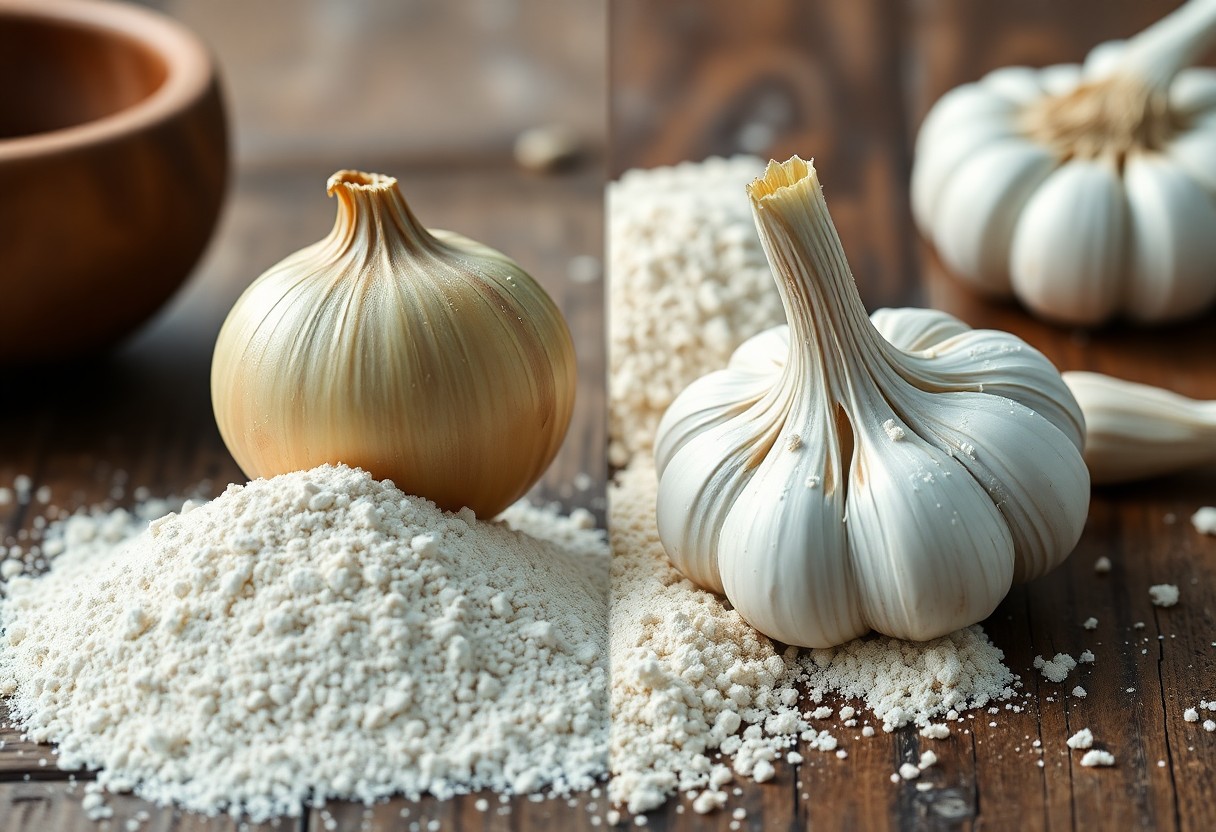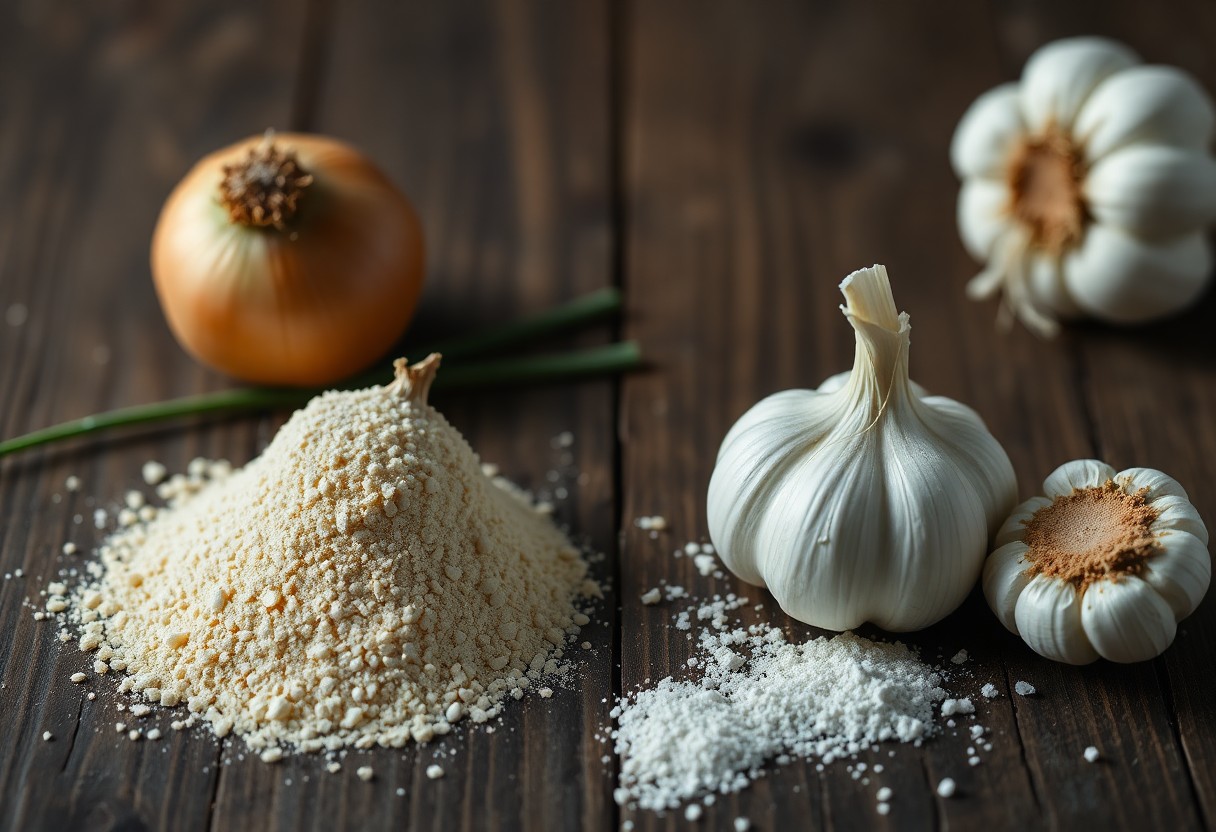Onion powder and garlic powder are staple ingredients in many kitchens, each offering unique flavors and health benefits. As you explore their differences, you’ll find that onion powder adds a sweet, mild taste, while garlic powder provides a more pungent and savory profile. Understanding these distinctions can help you choose the right seasoning for your dishes, whether you’re looking to enhance flavor or boost your health. Dive into the details to fully appreciate what each ingredient brings to your table.
Key Takeaways:
- Onion powder provides a mild, sweet flavor that complements dishes without overpowering them, while garlic powder has a stronger, more pungent taste often used to enhance savory flavors.
- Both onion and garlic powders offer health benefits, with garlic powder known for its potential cardiovascular advantages and onion powder being rich in antioxidants.
- They can be used interchangeably in recipes, but the choice between them can significantly alter the flavor profile of the dish, depending on the desired taste.
Nutritional Profiles
Before you make your selection in the kitchen, it’s necessary to understand the nutritional profiles of onion powder and garlic powder. Each serves not only as flavorful additives but also brings unique health benefits to your meals, impacting digestion and overall wellness. Knowing what sets them apart nutrition-wise can help you make informed decisions for your diet.
Onion Powder
Across various nutritional aspects, onion powder is a source of antioxidants and vitamins, including vitamin C and B vitamins. It contains quercetin, a powerful compound that may help reduce inflammation and support heart health. Additionally, its fiber content promotes digestive health, making it a wholesome ingredient in your cooking.
Garlic Powder
On the other hand, garlic powder is renowned for its remarkable health benefits, including enhanced immune function and cardiovascular support. Rich in allicin, it may help lower cholesterol and blood pressure, making it a valuable addition to your dishes for both flavor and health improvement.
Profiles show that garlic powder possesses potent anti-inflammatory and antimicrobial properties, helping to combat common colds and support your immune system. It’s important for you to know that while garlic can enhance heart health, high doses can lead to gastrointestinal issues for some, so moderation is key. Ultimately, including garlic powder in your meals can provide significant health advantages while adding robust flavor.

Flavor Profiles
One of the key differences between onion powder and garlic powder lies in their distinct flavor profiles, which can significantly influence your cooking. Onion powder tends to impart a mild, sweet, and slightly tangy taste, making it a versatile addition to various dishes. In contrast, garlic powder delivers a robust, pungent flavor that can elevate recipes with its savory and aromatic intensity.
Description of Onion Powder Flavor
Among the allium family, onion powder offers a gentle flavor that blends seamlessly into a variety of meals. Its sweetness is balanced by a subtle tanginess, allowing you to enhance dishes without overwhelming other ingredients. This makes onion powder a favorite for seasoning soups, stews, and marinades.
Description of Garlic Powder Flavor
Flavor wise, garlic powder is known for its strong, savory character that can transform the simplest dishes into culinary delights. Its bold essence provides depth and richness, contributing significantly to the overall flavor profile of your meals.
Another aspect to consider is that garlic powder can vary in potency depending on its source and processing. High-quality garlic powder will have a more pronounced aroma and flavor, offering a delicious alternative to fresh garlic while eliminating the hassle of peeling and chopping. However, you should be cautious as too much garlic powder can easily overpower a dish, so it’s best to use it sparingly for optimal balance.
Culinary Uses
Despite their distinct flavors, both onion powder and garlic powder are versatile kitchen staples that elevate various dishes. You will find them useful in seasoning meats, enhancing soups, and adding depth to sauces. Both powders have the ability to create the foundation of savory recipes or serve as a finishing touch to your culinary creations. Understanding their unique applications can help you achieve optimal flavor in your cooking.
Onion Powder Applications
Before you use onion powder, consider its benefits in your kitchen. It’s perfect for seasoning stews, dips, and marinades, and it allows you to achieve that onion taste without the hassle of peeling and chopping fresh onions. You can incorporate it into spice blends or sprinkle it on roasted vegetables for added flavor.
Garlic Powder Applications
An vital ingredient, garlic powder enhances a wide array of dishes, from savory sauces to marinades. You can use it to impart a rich garlic flavor to snacks like popcorn or mixed nuts, making it a go-to for creating flavorful appetizers. Its versatility extends into salad dressings, pasta, and even baked goods.
Understanding the potential of garlic powder helps you incorporate it into your meals effectively. For example, you can mix it into ground meat for burgers or meatballs, providing that signature garlic essence. Additionally, using garlic powder in baking can elevate your bread or rolls’ flavor profile. Keep in mind that too much garlic powder can overpower your dish, so it’s wise to start with a small amount and adjust to your taste. Incorporate it wisely to enhance your culinary creations without overwhelming the palate.

Health Benefits
After considering the culinary uses of onion and garlic powders, it’s important to note the health benefits they offer. Both powders contain imperative nutrients and compounds that can enhance your well-being. While each has unique properties, their contributions to your health are significant, making them excellent additions to your spice rack.
Benefits of Onion Powder
At its core, onion powder is a rich source of vitamins C and B6, which support your immune system and energy levels. It also contains antioxidants that can help reduce inflammation and promote heart health. By incorporating onion powder into your diet, you may experience improved digestion and enhanced overall health.
Benefits of Garlic Powder
Against all odds, garlic powder packs a punch with its robust health properties. It is known to contain allicin, a compound celebrated for its anti-inflammatory and antibacterial effects, which can boost your immune defense. It also helps lower blood pressure and regulate cholesterol levels, potentially reducing your risk of cardiovascular diseases.
Another standout feature of garlic powder is its ability to support your body’s detoxification processes. You may find that its potent antioxidants help combat harmful free radicals, improving your overall health. Regular use of garlic powder can enhance your metabolic rate and may even contribute to weight loss efforts by promoting fat burning. Embracing garlic powder in your meals can truly transform your health journey.
Possible Side Effects
To ensure a balanced approach to cooking and health, it’s important to be aware of the potential side effects associated with both onion powder and garlic powder. While these spices can enhance flavor and offer health benefits, they may also lead to adverse reactions in some individuals. Always listen to your body and consult a healthcare professional if you have concerns.
Onion Powder Side Effects
Before incorporating onion powder into your diet, be aware that it can cause digestive issues in some people, such as bloating or gas. Additionally, individuals who are allergic to onions may experience reactions ranging from mild to severe. Moderation is key to enjoying its benefits while minimizing potential side effects.
Garlic Powder Side Effects
On the other hand, garlic powder can also trigger unwanted side effects, especially when consumed in excess. Some individuals may experience heartburn, nausea, or even allergic reactions. It’s important to note that while garlic is often praised for its health benefits, excessive consumption can lead to discomfort.
At the same time, garlic powder holds significant positives. It is known to support your immune system and may provide cardiovascular benefits. However, the risk of gastric irritation and blood-thinning effects—especially for those on anticoagulant medication—are factors to consider. Always consult your healthcare provider for personalized advice, especially if you have health conditions or take medications.
Cost Comparison
Unlike some spices that heavily fluctuate in price, onion and garlic powders typically maintain stable pricing. Below is a comparative look at their costs:
| Product | Average Price per Ounce |
|---|---|
| Onion Powder | $2 – $4 |
| Garlic Powder | $3 – $6 |
Pricing of Onion Powder
Comparison shopping reveals that onion powder is generally more affordable than garlic powder, with prices ranging from $2 to $4 per ounce. This price point makes it an attractive option for those looking to add flavor without breaking the bank.
Pricing of Garlic Powder
At the higher end of the spectrum, garlic powder typically costs between $3 and $6 per ounce, depending on the brand and quality. You’ll find that the price can enhance your dishes but may require a slightly larger investment.
Hence, the investment in garlic powder often reflects its potential health benefits, including its antimicrobial properties and ability to boost the immune system. While it may cost more than its onion counterpart, the robust flavor and beneficial qualities can make it a worthwhile addition to your pantry. When purchasing, consider both quality and price to ensure optimal value for your culinary needs.
Summing up
Summing up, when choosing between onion powder and garlic powder, you need to consider their unique flavors and culinary applications. While onion powder offers a sweet, mild taste, garlic powder brings a more pungent, savory punch to your dishes. Both can elevate your cooking, but understanding their differences allows you to use them effectively. Whether you prefer the subtle warmth of onion powder or the boldness of garlic powder, incorporating them into your meals can enhance your overall culinary experience.
FAQ
Q: What are the main differences in flavor between onion powder and garlic powder?
A: Onion powder has a slightly sweet, pungent flavor that adds depth to dishes, while garlic powder offers a robust, savory flavor with a hint of spiciness. They can enhance different types of cuisine, with onion powder often used in soups and stews, whereas garlic powder is popular in marinades and spice blends.
Q: How are onion powder and garlic powder made?
A: Both onion powder and garlic powder are made by dehydrating their respective vegetables. Onions and garlic are sliced, dried, and then ground into a fine powder. The dehydration process helps to concentrate their flavors and extends their shelf life, making them convenient pantry staples.
Q: Can onion powder and garlic powder be used interchangeably in recipes?
A: While onion powder and garlic powder can be used to enhance flavor, they are not direct substitutes for one another due to their distinct tastes. If a recipe calls for one, using the other will alter the intended flavor profile. It’s best to consider the flavor purpose and adjust recipes accordingly.
Q: Are there any notable health benefits associated with onion powder and garlic powder?
A: Both onion powder and garlic powder contain antioxidants and have anti-inflammatory properties. Garlic powder is often highlighted for its potential to boost the immune system and improve cardiovascular health, while onion powder may assist in digestion and has similar anti-inflammatory benefits. Their nutritional profiles may vary, so it’s beneficial to include both in a balanced diet.
Q: How should onion powder and garlic powder be stored for optimal freshness?
A: To maintain their freshness, onion powder and garlic powder should be stored in a cool, dark place in airtight containers. Avoid exposure to moisture and heat, as these factors can degrade their flavor and potency over time. Properly stored, both powders can last for several months to a year.
